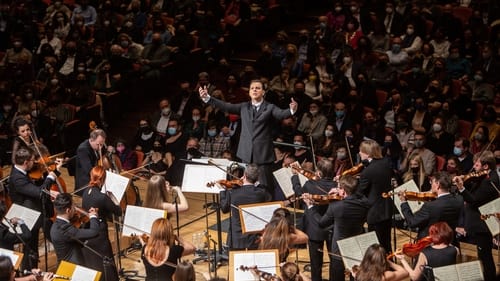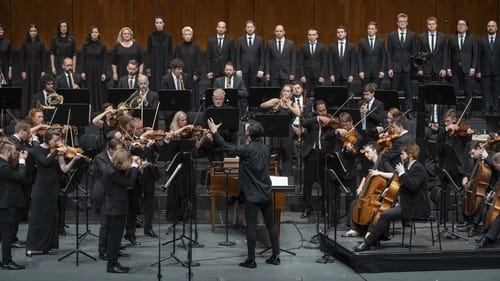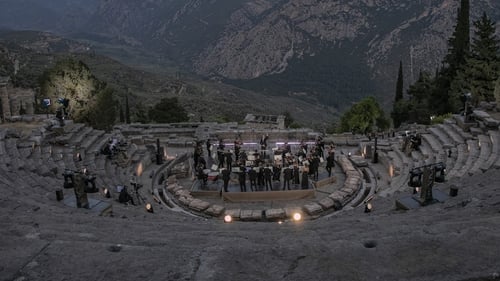musicAeterna
História
musicAeterna is an international ensemble, consisting of an orchestra and two chamber choirs, dedicated to historical performance practice of different epochs as well as to new music. It was founded in 2004 in the Russian metropolis of Novosibirsk by Teodor Currentzis, who has led the ensemble ever since. From 2011 to 2019, MusicAeterna was one of two orchestras and choirs of the Perm Opera and Ballet Theater.

Self – Orchestra / Choir
Ludwig van Beethoven headed for Symphony No. 9 literally his entire life. As early as the 1790s, he had an eye on Ode to Joy, perhaps the most well-known poem by Friedrich Schiller, written on the threshold of the French Revolution (1786). In his mature and, in particular, later years, the deaf composer with an acute ‘hearing vision’ increasingly distanced himself from conventional forms and genres and wrote parts beyond the possibilities of instruments of his day. He nurtured the idea of a symphony with a choir for at least several years. The history of the Ninth’s interpretations includes 200 years of staggering revelations and lingering stagnation. Performed by the musicAeterna orchestra, choir, and guest soloists under the baton of Teodor Currentzis, Beethoven’s opus magnum acquires the original poignancy and energy of a recent discovery.

Self – Orchestra
For Mahler, symphonies always were a means of interpreting the most convoluted philosophical problems that couldn’t be resolved verbally. The ambitious structure of the five-part Fifth Symphony spans from the Funeral March to the roaring finale. It is a forthright attempt to resolve the tragic conflict with the surrounding world. The brilliant fourth part of the symphony, Adagietto, resembles a beautifully mysterious flower that every conductor reimagines in their own style. As one of the twentieth century’s most influential maestros, Mahler redefined the conductor’s role. For him, the conductor is just as integral to his own musical works as they are to the composer. When a maestro steps onto the podium and opens the score, he recreates musical universes from scratch. Teodor Currentzis and the musicAeterna orchestra have performed Mahler’s symphonies around the world for many years. The Fifth Symphony has earned its place as one of the highlights of the cycle.

Self – Orchestra / Choir
At the Salzburg Festival 2021, the musicAeterna Orchestra conducted by Teodor Currentzis performed the last symphonies of Wolfgang Amadeus Mozart – No. 40 K. 550 and No. 41 K. 551 Jupiter. The two pinnacles of Mozart’s symphonic heritage are interconnected: the classic wrote symphonies No. 39–41 in one short period of just a few fruitful weeks in 1788. In the concert the two symphonies – the two sides of Mozart’s unfathomable genius – are joined by works that are close to them both in spirit and the time of creation: the orchestral Masonic Funeral Music in C minor, the recitative and aria of Donna Anna from the finale of the opera Don Giovanni and the chorus from the spiritual cantata Davide penitente created in 1785.

Self – Orchestra / Choir
Premiered in 1787, “Don Giovanni” exposes the timeless theme of a man hovering between vitality and destruction. Neither morality nor the law can stop this serial lover in his quest to conquer all women as he places his own pleasure above all other principles. Today, the rich depth of Mozart’s masterpiece still astonishes audiences with its mix of comedy and seriousness, pleasure and love, entertainment and murder. At the helm of this new Salzburg Festival production, in a near-live broadcast from the Great Festival Hall, director Romeo Castellucci promises to focus on the ambiguity and inner turmoil of this serial lover whose immoral behaviour condemns him to a deadly solitude. The exceptional cast – featuring Italian baritone Davide Luciano (Don Giovanni), Russian soprano Nadezhda Pavlova (Donna Anna) and Finnish bass Mika Kares (the Commendatore) – is accompanied by the chorus and musicians of the musicAeterna ensemble, conducted by Vitaly Polonsky and Teodor Currentzis.

Self – Orchestra
In the ancient theater of Delphi, against the backdrop of the ruins of the Temple of Apollo, musicAeterna, conducted by Teodor Currentzis, performs Ludwig van Beethoven’s 7th Symphony, in conjunction with a new choreography by Sasha Waltz and her company.

Self – Orchestra / Choir
Considered to be one of his most brilliant creations, Mozart’s Idomeneo is a perfect masterpiece for the two enfants terribles of classical music and opera staging, conductor Teodor Currentzis and stage director Peter Sellars. Joined by the exceptional voices of Russell Thomas, Paula Murrihy, Ying Fang, and Nicole Chevalier, this is a one-of-a-kind performance of the score in the city where its creator was born!

Orchestra / Choir
Guiseppe Verdi’s Requiem is still heard mainly in theatre and concert halls. However, the author himself intended this composition to be performed in church, and on special occasions. Conducted by Teodor Currentzis and performed by soloists and musicAeterna choir and orchestra, Verdi’s famous funeral mass returns from the concert stage to Milan’s Church of San Marco, the same place where it was premiered in 1874. The seven parts of the Requiem become steps on the way to comprehending the sacrament of death, the operatic character of orchestral and vocal writing acquires the strictness of the Catholic tradition, and musical images of rage, despair, and rebellion against the inevitable end are crowned with appeasement.

Self – Orchestra / Choir
A superb adaptation of Purcell's the Indian Queen, staged and directed by Peter Sellars and performed in 2013 at the Teatro Real in Madrid. Peters Sellars combines John Dryden and Robert Howard's libretto with a short-story written by the Nicaraguan writer Rosario Aguilar, La niña blanca y los pájaros sin pies.









